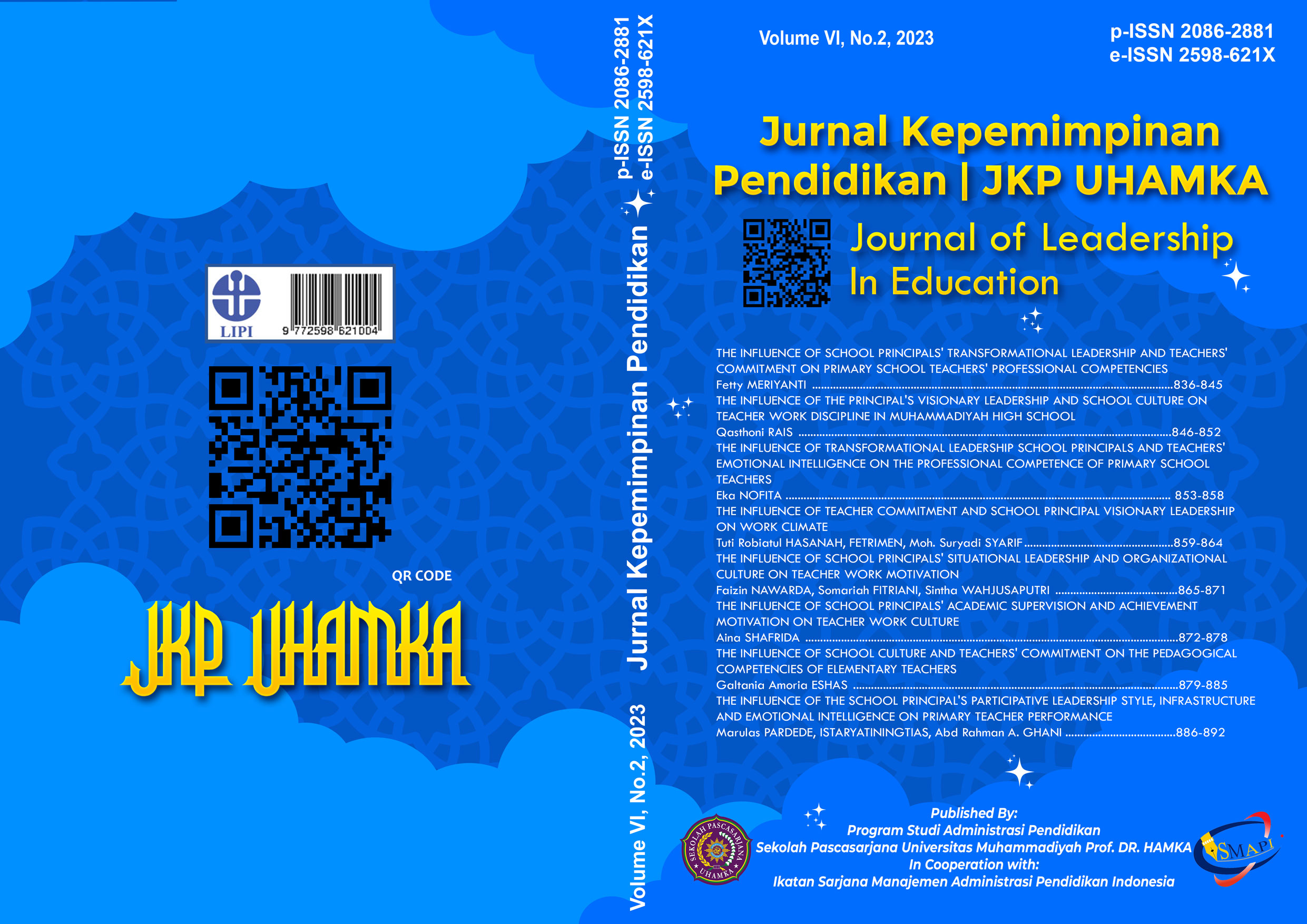THE INFLUENCE OF SCHOOL PRINCIPALS' SITUATIONAL LEADERSHIP AND ORGANIZATIONAL CULTURE ON TEACHER WORK MOTIVATION
DOI:
https://doi.org/10.22236/jkpuhamka.v6i2.14513Keywords:
Situational Leadership, Organizational Culture, Teacher Work MotivationAbstract
The purpose of this research is to analyze and test: (1) The influence of the principal's situational leadership on teacher work motivation. (2) The influence of organizational culture on teacher work motivation, (3) The influence of the principal's situational leadership on organizational culture. This research is a quantitative survey type research. The population in this study were all teachers in Pancoran District Public Elementary Schools, South Jakarta, with a sample of 124 teachers taken at random (random sampling). The analysis technique used is the path analysis technique. The results of this research show that (1) There is no significant influence of the Principal's Situational Leadership on the Work Motivation of Public Elementary School Teachers in Pancoran District, South Jakarta. (2) There is a direct positive and significant influence of Organizational Culture on the Work Motivation of Public Elementary School Teachers in Pancoran District, South Jakarta. (3) There is a direct positive and significant influence of the Principal's Situational Leadership on the Organizational Culture of Public Elementary Schools in Pancoran District, South Jakarta. The conclusion in this research is that to create teacher work motivation, the principal should understand follower behavior and the situation before using certain leadership behavior. The organizational culture in the school should be able to identify the characteristics of each teacher to create harmonious relationships between members of the school environment and provide mutual motivation between teachers.
Downloads
References
Amalda. (2018). Pengaruh Motivasi Kerja Guru, Disiplin Kerja Guru, Dan Kedisiplinan Siswa Terhadap Prestasi Belajar Siswa. Jurnal Akuntabilitas Manajemen Pendidikan, 6(1), 11. https://doi.org/10.21831/amp.v6i1.7515
Andreas, L. (2006). Kepemimpinan dan Kinerja Organisasi, Isu, Teori dan Solusi (Pertama). Amara Books.
Aprida, Y., Fitria, H., & Nurkhalis, N. (2020). Pengaruh Supervisi Kepala Sekolah dan Motivasi Kerja Guru Terhadap Kinerja Guru. Journal of Education Research, 1(2), 160–164. https://doi.org/10.37985/joe.v1i2.16
Ardiana. (2017). Pengaruh Motivasi Kerja Guru Terhadap Kinerja Guru Akuntansi Smk Di Kota Madiun. Jurnal Akuntansi Dan Pajak, 17(02), 14–23. https://doi.org/10.29040/jap.v17i02.11
Azizah. et al. (2017). Pengaruh Kepemimpinan Situasional dan Budaya Organisasi Terhadap Motivasi Kerja dan Kinerja Karyawan. 4.
Chichi Rahmayanti, P. H. W. C. C. W. (2018). Pengaruh Gaya Kepemimpinan Situasional, Budaya Organisasi Dan Kompensasi Terhadap Kinerja. Jurnal Ekonomi, 23(3), 319. https://doi.org/10.24912/je.v23i3.416
Dewi, R. S. (2018). Kemampuan Profesional Guru Dan Motivasi Kerja Terhadap Kinerja Mengajar Guru Sekolah Dasar. Jurnal Administrasi Pendidikan, 25(1), 150–159. https://doi.org/10.17509/jap.v25i1.11581
Dwiyani, D. (2018). Motivasi Kerja Guru Sebagai Determinan. Jurnal Manajemen Dan Sistem Informasi, 3(4), 83–94.
Edy Sutrisno. (2018). Budaya Organisasi (Kelima). Prenada Media Grup.
Fonda, B. (2015). Pengaruh Gaya Kepemimpinan Situasional Terhadap Budaya Organisasi dan Kepuasan Kerja Karyawan (Studi pada Karyawan PT. Telekomunikasi Indonesia Tbk. Wilayah Malang). 25(1).
George, L. (2014). Work Motivation of Teachers: Relationship with Organizational Culture. European Journal of Educational Sciences, 1(2), 194–207.
Hakim. (2020). Motivasi Kerja Dan Kompensasi Terhadap Kepuasan Kerja Guru Smk Swasta Di Wilayah Timur Kabupaten Pemalang. Jurnal Pendidikan Ilmu Sosial, 29(2), 105–115. https://doi.org/10.23917/jpis.v29i2.9354
Khoironi, N. (2020). Kepemimpian Situasional dalam Pendidikan Islam. Jurnal MUDARRISUNA, 10(4), 670.
Koniswara. (2019). Gaya Kepemimpinan Situasional Terhadap Motivasi Kerja Karyawan Pada Pt Garuda Indonesia (Persero) Tbk Cabang Kupang. EKOBIS : Jurnal Ilmu Manajemen Dan Akuntansi, 7(1), 1–15. https://doi.org/10.36596/ekobis.v7i1.69
Kreitner, & Kinicki. (2013). Perilaku Organisasi (Pertama). Salemba Empat.
Latham, G. P. (2005). Work motivation theory and research at the dawn of the twenty-first century. Annual Review of Psychology, 56(February 2005), 485–516. https://doi.org/10.1146/annurev.psych.55.090902.142105
Muis, M. R., Jufrizen, J., & Fahmi, M. (2018). Pengaruh Budaya Organisasi Dan Komitmen Organisasi Terhadap Kinerja Karyawan. Jesya (Jurnal Ekonomi & Ekonomi Syariah), 1(1), 9–25. https://doi.org/10.36778/jesya.v1i1.7
Murni, T. (2021). Pengaruh Kepemimpinan Dan Budaya Sekolah Terhadap Motivasi Kerja Guru Yayasan Sinar Husni Medan. Jurnal Manajemen Pendidikan Dasar, Menengah Dan Tinggi [JMP-DMT], 2(3), 119–136. https://doi.org/10.30596/jmp-dmt.v2i3.7699
Noviani. (2018). Pengaruh Gaya Kepemimpinan Situasional, Motivasi dan Pelatihan pada Kinerja Karyawan di Koperasi Pasar Srinadi Klungkung. E-Jurnal Akuntansi, 25, 2212. https://doi.org/10.24843/eja.2018.v25.i03.p22
Priyatno. (2012). Belajar Praktis Analisis Parametik dan Non Parametik dengan SPSS. Gava Media.
Rira Nuradhawati. (2021). Diskursus Kepemimpinan Situasional (Pertama). DEEPUBLISH.
Rivai, A. (2020). Pengaruh Kepemimpinan Tranformasional Dan Budaya Organisasi Terhadap Kinerja Karyawan Ptpn Ix Batujamus. Jurnal Ilmiah Magister Manajemen. https://doi.org/10.55606/jupumi.v1i1.243
Rosvita, V., Setyowati, E., & Fanani, Z. (2017). Pengaruh Budaya Organisasi Terhadap Kinerja Karyawan PT Bintang Bumi Kudus. Indonesia Jurnal Farmasi, 2(1), 14–20.
Schweikle, N. B. (2014). SITUATIONAL LEADERSHIP - How to effectively lead and motivate employees through each development stage. November, 80. https://www.theseus.fi/bitstream/handle/10024/82414/schweikle_nataly.pdf?sequence=1
Sintha Wahjusaputri. (2015). Pengaruh Kepemimpinan Kepala Madrasah, Pengembangan, Budaya Kerja Dan Self Learning Terhadap Kompetensi Pedagogik Guru Madrasah Aliyah Negeri (Man) Di Kawasan Pesisir Pantai Utara Jakarta. Edukasi Islami Jurnal Pendidikan Islam, 04(2), 1145–1155.
Solehatin Ika et. al. (2022). Perilaku Organisasi (Tinjauan Teoritis) (Pertama). Media Sains Indonesia.
Stephen P. Robbins. (1996). Perilaku Organisasi (Edisi ke 7). Prehallindo.
Su’ud, M. (2017). Risensi Buku Kepemimpinan: Teori Dan Praktik. Kajian Bisnis STIE Widya Wiwaha, 23(1), 433. https://doi.org/10.32477/jkb.v23i1.205
Sugiyono. (2018). Metode Penelitian Kuantitatif (Cet. 1). Alfabeta.
Suharso. (2009). Metode Penelitian Kuantitatif untuk Bisnis: Pendekatan Filosofi dan Praktis. PT. Indeks.
Sutoro. (2020). Pengaruh Budaya Organisasi terhadap Motivasi Kerja Pegawai BPSDM Provinsi Jambi. Jurnal Ilmiah Universitas Batanghari Jambi, 20(1), 104. https://doi.org/10.33087/jiubj.v20i1.863
Trépanier, S., Peterson, C., Gagné, M., Levesque-côté, J., Howard, J. L., Trépanier, S., & Fernet, C. (2023). Revisiting the Multidimensional Work Motivation Scale ( MWMS ) Revisiting the Multidimensional Work Motivation Scale ( MWMS ). European Journal of Work and Organizational Psychology, 32(2), 157–172. https://doi.org/10.1080/1359432X.2022.2116315
Vina Febiani et. al. (2022). Supervisi Akademik untuk Meningkatkan Motivasi Kerja Guru dalam Membuat Perangkat Pembelajaran. JIIP (Jurnal Ilmiah Ilmu Pendidikan), 5, 1936–1941.
Walean. (2022). Analisis Gaya Kepemimpinan Situasional Kepala Sekolah. Jurnal Bahana Manajemen Pendidikan, 11(1), 65. https://doi.org/10.24036/jbmp.v11i1.116867
Yulk. (2007). Kepemimpinan Dalam Organisasi (E. Kelima (ed.)). PT Indeks.

Downloads
Published
How to Cite
Issue
Section
License
Copyright (c) 2024 Faizin NAWARDA, Somariah FITRIANI, Sintha WAHJUSAPUTRI

This work is licensed under a Creative Commons Attribution 4.0 International License.














